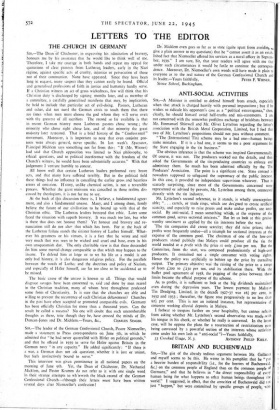THE .CHURCH IN GERMANY
LETTERS TO THE EDITOR
SIR,—The Dean ofChichester, in expressing his admiration of bravery, honours me by his assurance that he would like to think well of me.
Therefore, I take my courage in both hands and repeat my appeal for quotations of clear protests from Lutheran leaders, early in the Nazi regime, against specific acts of cruelty, injustice or persecution of those not of their communion. None have appeared. Since they have been long in request, many suspect that they cannot easily be found. Official and generalised professions of faith in justice and humanity hardly serve.
If a Christian witness an act of gross wickedness, few will think that his Christian duty is discharged by signing, months later, and as member of a committee, a carefully generalised manifesto that may, by implication,
be held to include that particular act of evil-doing. Pastors, Lutheran and other, did not need the German crisis to teach them that there are times when men must choose the god whom they wall serve even with the greatest of all sacrifices The record so far available is that
in recent German history most Lutheran pastors chose wrong ; the minority who chose right chose late, and of, that minority the great majority later retreated. That is a brief history of the " Confess:onal"
movement. Moreover, it is important to note that even conjoint pro- tests were always general, never specific. In last week's Spectator, incipal Micklem says something not far from this: "If (Mr. Wiener) had said that Church opposition was limited to Nazi philosophy, to
ethical questions, and to political interference with the freedom of the Church's witness, he would have been substantially accurate." With that judgement I venture humbly to concur.
All know well that certain Lutheran leaders performed very brave acts, and that many have suffered terribly. But in the political field these things had no influence in cancelling the earlier gross and heartless errors of omission. History, unlike chemical action, is not a reversible process. Whether the great omission was cancelled in those realms dis- cussed by theologians, it is not for me to say.
At the back of this discussion there is, I believe, a fundamental agree- ment, and also a fundamental unease. Many, and I among them, firmly
believe the future of our civilisation to be bound up with that of the Christian ethic. The Lutheran leaders betrayed that ethic. Later some faced the situation with superb bravery. It was much too late, but who is there that does not honour them? Yet honour and bravery and re- nunciation still do not alter that which has been. For at the back of the Lutheran failure stands the sinister history of Luther himself. What- ever his greatness or his virtues, it is a fact that he wrote and said very much that was seen to be wicked and cruel and base, even in his own unsqueamish day. The only charitable view is that there descended an him some mental change comparable to that which may happen to the insane. To defend him at large or to set his life as a model is' not only bad history, it is also dangerous religious policy. For the parallels between the words of Luthez and the doctrines and policy of Nazism, and especially of Hitler himself, are far too close to be accidental or to be missed.
The basic cause of the unease is known to all. Things that- would disgrace savages have been consented so, said and done by men reared in the Christian tradition, many of whom have throughout professed some form of Christianity. Is it sure that the churches are able and willing to prevent the recurrence of such Christian debasement? Churches in the past have often accepted or promoted comparable evils. Germany has been officially Christian for more than a thousand years. Can the result be called a success? No one will doubt that such uncomfortable thoughts as these, trite though they be, have crossed the minds of Dr.
Duncan-Jones and Dr. Micklem.—Yours, &c., CI1ARLES SINGER.


























 Previous page
Previous page